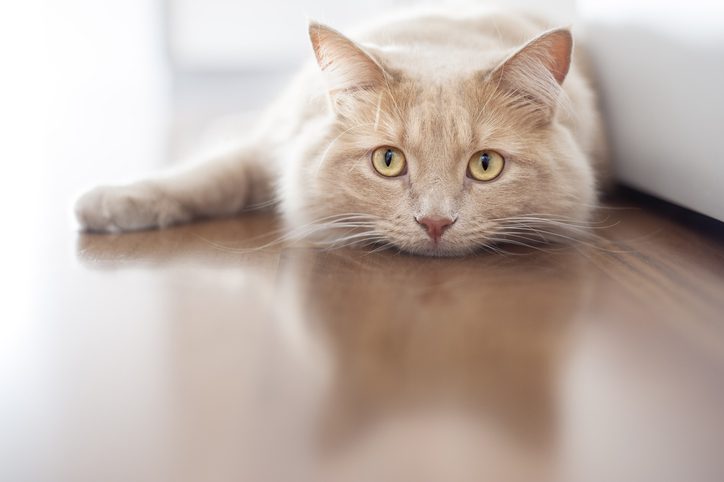Why is my Cat Vomiting in Warrick County?
Cats are sometimes known as pets that tend to vomit on a regular basis. Some breeds of cats are more prone to having sensitive stomachs, but that does not mean that any breed of cat should be vomiting daily. Cats that are vomiting all the time could have a variety of different conditions that are impacting their well-being.
Knowing more about cat vomiting can be important to keeping your cat healthy. You should be aware of the common reasons for cat vomiting as well so that you can be sure that you are not ignoring signs of a major illness or health concern. While cats are not always as demonstrative as dogs about their feelings, you can still learn to recognize the signs of distress in your cat that might initiate a vet visit. If you are ready to learn some more about why your cat might be vomiting in Warrick County, you need to keep reading.

Reasons That Your Cat Might Be Vomiting
There are some common reasons that cats can vomit on a regular basis. You should be familiar with these common reasons so that you can determine what kinds of vomiting are serious and which kinds are not. Vomiting can be a sign of simple problems that are easy to fix, but it might also be a symptom of really serious health conditions.
Listed below are the main reasons:
Hairballs
Cats can sometimes have vomiting issues related to hair that they have ingested as they are grooming themselves. This kind of vomiting is usually episodic, and you can usually tell visually that a hairball has been the reason for your cat’s vomiting spell. This can be a kind of vomiting that is not that concerning and that most cats experience at some point. However, if your cat seems lethargic, is vomiting multiple times a day, or isn’t interested in food, you should still take them to the vet.
Poisoning
Vomiting related to toxicity of some kind is usually really easy to recognize. This is usually a much more violent kind of vomiting, and your cat might have diarrhea as well. Cats that are exposed to toxic substances might breathe rapidly, be unresponsive and listless, and could have pale gums. Make sure that you do not hesitate to take your cat to the vet if you think that they have ingested something that is not edible. Time is everything in poisoning cases, and the sooner your cat gets treatment, the better. The Animal Poison Control hotline through the ASPCA is also a great starting point if you know what your cat has ingested to find out if it is toxic to them. The hotline number is (888) 426-4435.
Food Allergies
If your cat seems to only be vomiting right after they have eaten, you will need to consider food allergies as a primary culprit behind this vomiting. You will find that many pets can be allergic to common pet foods, and that is why many pet food companies make allergy-friendly food formulas. Food allergies can take a toll on your pet’s health, so you should not view this as a mild problem. To determine if your cat has a food allergy, you and your vet will work together to ensure accurate diagnosis and treatment.
Organ Dysfunction
There are various kinds of organ problems that can cause vomiting, and your vet will need to be involved to help identify the organ that is not doing its job. Not all of these conditions can be treated with ease, but knowing which organ is causing the issue can help greatly. You might be able to modify the diet of your cat or put them on medications that can help you to make your cat more comfortable and to control vomiting for their comfort.
Organ failure can be linked with age or, in some younger cats, something wrong with the way the organ was formed from birth. Organ dysfunction in cats can be tough to manage, but you will have much better luck with this treatment process if you take your cat to the vet to get an accurate diagnosis.
Bacterial Infections
If your cat has an infection somewhere in its body, vomiting might be a symptom of this illness. Vomiting can be the body’s response to the toxicity that is caused by the infection. If the infection is internal, you might not be able to tell that there is an infection causing the vomiting that your cat is experiencing. Your cat will usually also be dehydrated and might have hot footpads and a dry nose if they have an infection. Bacterial infections can be very easy to treat, but if the infection is really advanced, your cat might need some specialty care to deal with this kind of illness.
Cat Vomiting Can Call For a Visit to the Vet
If your cat has been vomiting often or seems not to be feeling very well in general, you need to take them to the vet right away. The sooner that your cat gets a diagnosis for a reason behind its vomiting behavior, the easier it will be to get them the help that they need to feel better. Food allergies and some other common problems can still make your cat feel quite poorly, and you will want to be sure that your cat is not refusing to drink or eat for a prolonged period of time.
Cats can vomit for a variety of reasons, and if the vomiting spell is short in duration and your cat seems to be feeling better right away, you might not need to worry. Make sure that you pay attention to your cat’s eating and drinking behavior if they have been vomiting as well. Cats need to drink frequently to keep their kidneys functioning properly, and you do not want to be unaware that your cat is dehydrated for a prolonged period of time.
Cat vomiting can be messy and frustrating, but a visit to the vet can often resolve the issue behind this problem with ease. For more information, or if you would like to schedule an appointment, contact Warrick Veterinary Clinic by calling (812) 897-4855. We provide compassionate veterinary care to the pets near Warrick County, IN and will be there for you and your pet every step of the way.
